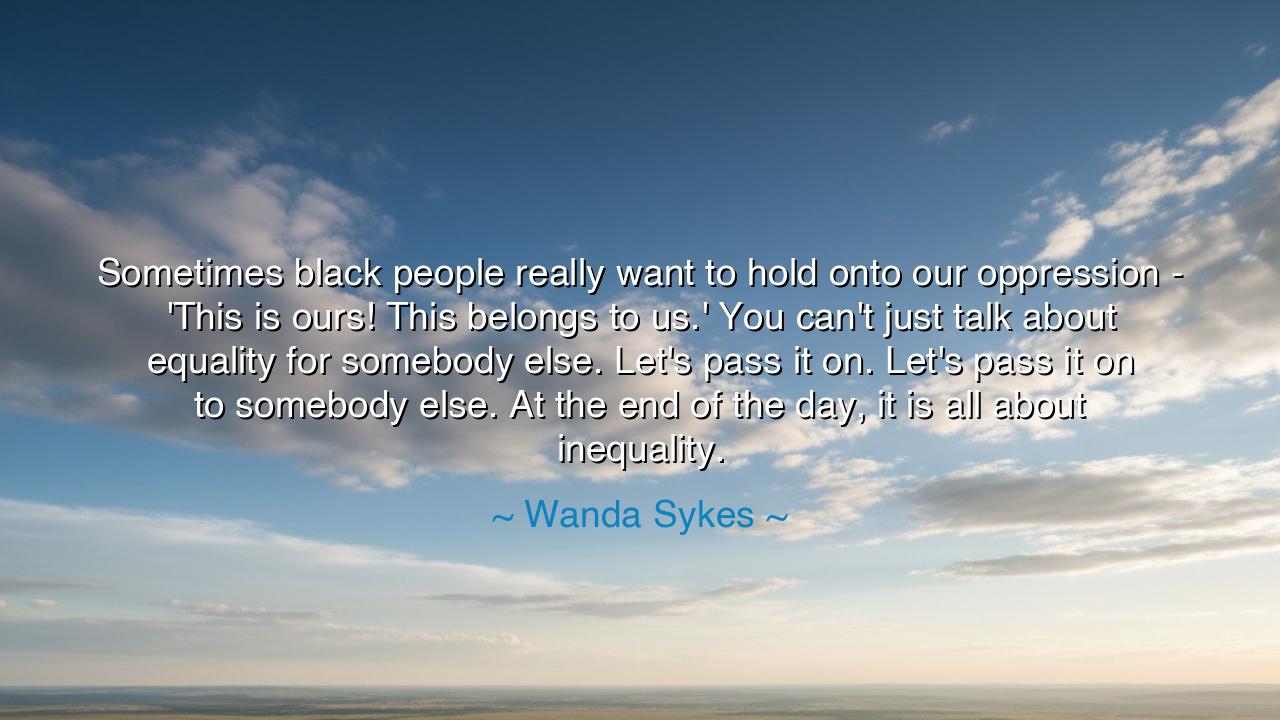
Sometimes black people really want to hold onto our oppression -
Sometimes black people really want to hold onto our oppression - 'This is ours! This belongs to us.' You can't just talk about equality for somebody else. Let's pass it on. Let's pass it on to somebody else. At the end of the day, it is all about inequality.






Hear now, O listeners and children of the long struggle, the words of Wanda Sykes, who, with wisdom wrapped in humor and courage forged by truth, declared: “Sometimes black people really want to hold onto our oppression — ‘This is ours! This belongs to us.’ You can’t just talk about equality for somebody else. Let’s pass it on. Let’s pass it on to somebody else. At the end of the day, it is all about inequality.” These words, spoken with fire and honesty, strike deep at the heart of the human condition — for they remind us that even the oppressed, when healed, must not cling to their chains, nor claim ownership of suffering, but must instead become bearers of justice for all.
The meaning of Sykes’s words lies in the paradox of pain: that sometimes, what has wounded us becomes our identity. Through centuries of enslavement, segregation, and systemic inequality, Black people in America have endured one of history’s most relentless injustices. That endurance gave rise to pride, to unity, to power — but also, sometimes, to attachment. Sykes does not mock the suffering of her people; she calls them higher. She warns that if we guard our wounds as trophies rather than lessons, we risk turning liberation into another form of bondage. The true purpose of overcoming oppression is not to hoard its memory as exclusive property, but to use it as a beacon — to fight inequality wherever it lives, even when it does not wear our own face.
The origin of her reflection springs from both history and experience. Wanda Sykes, as a Black woman and comedian, has stood at the crossroads of race, gender, and truth, where laughter becomes a sword sharper than silence. She has witnessed a world that celebrates progress while still breathing inequality in subtle forms. Her insight echoes the lessons of those who came before — of Martin Luther King Jr., who taught that “injustice anywhere is a threat to justice everywhere,” and of Nelson Mandela, who, having suffered under apartheid, emerged not to claim vengeance but to extend freedom. Like them, Sykes understands that the victory of one group over another is not justice — only the victory of equality over injustice is.
Consider, my listeners, the story of Harriet Tubman, who, though she escaped slavery’s grasp, did not rest in her own freedom. She returned, again and again, through danger and darkness, to free others still bound. She did not say, “My suffering is mine to keep,” but “My deliverance must be shared.” In her, we see the truth of Sykes’s words: that to be free is to become a liberator. Those who clutch pain too tightly risk turning it into a relic of pride, but those who transform it into compassion become the builders of a better world.
When Sykes says, “You can’t just talk about equality for somebody else,” she speaks against hypocrisy — against the temptation to believe that our own liberation is enough. She calls us to examine the ways we unconsciously recreate hierarchies even after fighting against them. For the spirit of inequality is cunning; it shifts its form, moving from one body to another, one cause to the next. The oppressed of yesterday can become the indifferent of today. Therefore, vigilance must never sleep. The work of equality does not end when we are free — it begins anew, in how we extend that freedom to others.
In these words, there is both challenge and compassion. Sykes urges us not to cling to identity through suffering alone, but to expand our understanding of justice — to see it as a river that must flow beyond the boundaries of race, gender, or nation. The oppressed must not become the gatekeepers of grievance, but the stewards of empathy. To “pass it on,” as she says, is not to spread pain, but to share awareness — to ensure that the lessons learned in struggle become the foundation of a more just society.
Therefore, O children of the long road, take this teaching to heart: the measure of your freedom is not how far you have risen, but how many you lift with you. Hold your history close, but not so tightly that it blinds you to the suffering of others. Let oppression become your teacher, not your treasure. Let equality become your mission, not your monument. For if we claim the right to justice, we must claim the duty to extend it.
Thus spoke Wanda Sykes, with humor as her sword and truth as her shield. Her words remind us that liberation is not a destination, but a journey — one that demands humility, courage, and a heart wide enough to hold all humanity. Let none say, “This pain is mine alone,” but rather, “This wisdom is ours together.” Only then shall the chains of the world fall away, not piece by piece, but all at once — when every people, born of struggle, chooses to pass on not their wounds, but their light.






AAdministratorAdministrator
Welcome, honored guests. Please leave a comment, we will respond soon